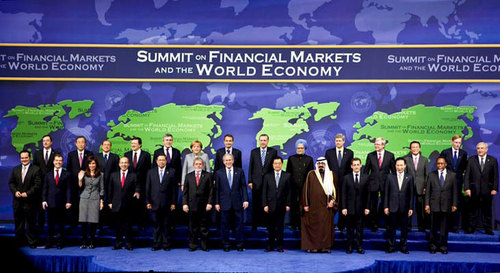
David Shorr is a program officer at the Stanley Foundation and co-editor of Powers and Principles: International Leadership In A Shrinking World.
Parag Khanna and I have the opposite worries about the future of the G-20.
Parag warns against expecting too much of the G-20; I worry about aiming too low. We actually have fairly similar ideas about holding the G-20 accountable for meaningful action, but where Parag sees constraints, I see comparative advantage. Where he sees a need for leaders to conserve their political will, I see a need to expend it. There are a lot of questions still to be figured out regarding how 21st century diplomacy and geopolitics will work, but the chief aim must be serious action on today’s international challenges.
The paradox of summit diplomacy and the G groupings is that they convene top decision makers for discussions that don’t actually make decisions as traditional inter-governmental organizations do. This poses a serious, yet by no means insoluble, practical problem. Leaders have to choose what kinds of commitments to make, with an eye toward implementation by their own governments, persuasion of other countries (the G-172), and links to more formal multilateral bodies.
Closely intertwined with this question is the matter of what issues should be on the G-20 agenda? My answer is that the G-20 leaders (or alternative G-8 successor – what we call “G-X”) should deal with issues that cry out for the political impetus that only they can provide. Notwithstanding the G-20’s lack of formal or legal authority, it nonetheless represents an impressive aggregation of global power and influence, which I view as a precious commodity.
The G-7 is often described as a coalition of the like-minded (read Western). The value of a G-X is to have closer cooperation among the un-like minded. As outlined in my organization’s summit reform guidelines, its agenda should focus on issues which have been fraught by deep but bridgeable divisions (particularly North-South) that have impeded progress on urgent problems. Parag has nominated agricultural subsidies and dispersal of green technology, and those are strong candidates indeed.
I also agree with Parag about the need for greater transparency and follow-through on leaders’ summit commitments and avoiding getting caught up in flavor-of-the-month issues. In the end, it will come down to policy making discipline.
The fact that summit communiques can run to over 100 pages is a clear indicator of the remaining room for improvement. I’m sure that the sherpas that work on this process — and the leaders on whose behalf they negotiate — would be gratified to put their efforts toward maximum effect. Unlike Parag, though, I don’t think the demands on leaders for follow-through serves as a constraint on the agenda to the same degree as the work of identifying common ground in the first place.
Here’s another test. Looking at current challenges of non-proliferation, climate change, and economic development, how do we foresee problems worsening absent significant action and progress in the next two, three, or five years? Basically, it’s a test of leadership. How will leading nations lead?
— David Shorr


One comment on “Guest Post by David Shorr: The Expectations Game”